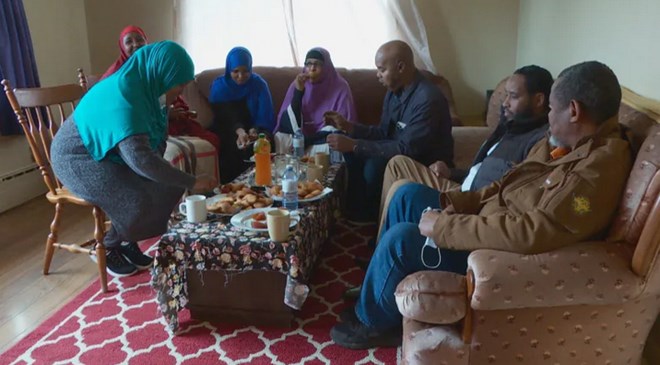CBC.ca
Tuesday November 23, 2021

Walking into Abdirashid Ali Ahmed's house in Charlottetown, there is an immediate sense of warmth and welcome.
His house has become something more than his family's home over the past few months — it's also a place for members of P.E.I.'s Somali community to come together and feel a little more at home on the Island.
Ali Ahmed came to Canada with his wife and children in 2019 after living in a refugee camp in Kenya.
"13 children, my wife, me — 15-person family," he said.
He said he received a warm welcome when he got to P.E.I., but resettling here also brought challenges. He didn't speak English and wasn't familiar with customs and culture on the Island, which sometimes made accessing services like health care, employment and education difficult.
Now, Ali Ahmed and a group of volunteers from the Somali community have created the Somali Community Centre of P.E.I. to help make the that transition easier for others.
They've produced a website to help connect newcomers from Somalia — specifically those who come to Canada as refugees — with others in P.E.I.'s Somali community. It also offers information on accessing language and employment supports, health care, housing, education, and social and recreational activities for children and adults.
Jeylani Abdulkadir does community outreach for the group and says many in P.E.I.'s Somali community came to the Island through the federal government's refugee resettlement program, which offers financial and resettlement support for the first year on P.E.I. The new group wants to help carry forward that support once that first year year is over.
"When you're very new to a place, a culture, a community that you've never been in to, everything seems kind of surprising," Abdulkadir said.
"If newcomers, they arrive on P.E.I. after the first-year window, then there's another option for them, second chance for them. There's a community willing to help them, guide them, make sure that they progress, they develop, they thrive."
'I don't know how to communicate'
Sahro Cigaal came to P.E.I. from Somalia a decade ago with her six children. She said she received support from the Immigrant and Refugee Services Association of P.E.I, formerly known as the P.E.I. Association for Newcomers to Canada. But she said day-to-day tasks like calling a taxi or going to the doctor could still be intimidating.
"When your child's sick, or you sick … when you go to clinic, I don't know how to communicate with the doctor, it's very difficult," she said.
Cigaal said everyone coming to Canada through the refugee program comes with different experiences and may need support for longer. She said she has been helping one Somali family who came from a refugee camp and are learning about household utilities for the first time, like what to do when a furnace or appliances stop working.
"When they come to Canada they struggle a lot and I help them many times because they come from refugee camp and they didn't know what they doing inside the house," Cigaal said.
That's where she and the community centre can step in, she said. She also hopes having a centre encourages more people who resettle on P.E.I. to stay, as she has seen many move on to other parts of Canada where the Somali community is larger and more visible.
'Gives them an anchor'
The creation of a community centre is a good sign things are headed in that direction, said Craig Mackie, executive director of the Immigrant and Refugee Services Association of P.E.I.
"It gives them an anchor, it gives them a place where they can speak in their own language, share their own food. We often hear that the thing that's missed most by people who have come to P.E.I. is food from home," he said.
"I think it's a good sign when people want to come together and as I say, put an anchor into life on P.E.I."
Mackie said IRSA offers the resettlement assistance program for government-assisted refugees coming to the Island, which helps newcomers find housing and employment, and access language training and any other resettlement supports. It also supports newcomers who don't arrive through the refugee program.
He said once people arrive on P.E.I. through that program they become permanent residents and can access social programs offered by the province in their second year and beyond, if needed.
He said there are organizations doing similar work for other communities on P.E.I., and this communal support is important for people to thrive.
"These are all really positive signs of people feeling safe and comfortable and wanting to put down roots here, and I think it's really positive," Mackie said.
According to the province, the Department of Tourism and Culture also funds community partners, including the CBDC Community Navigators, BIPOC USHR, the Black Cultural Society and P.E.I. Connectors to "ensure newcomers and refugees have a seamless integration into Prince Edward Island."
Door is always open
Abdulkadir said the group recently met with their MLA Hannah Bell to help them find office space. She also raised the issue in the P.E.I. Legislature and has requested meetings with the minister of social development and housing and the minister of tourism and culture to discuss ways to help.
"Our vision is to see that this community really grows and develops and thrives within P.E.I.," Abdulkadir said.
For now, the Somali Community Centre of P.E.I. will continue to offer services through its website and from the members' living rooms, where they say their doors are always open.